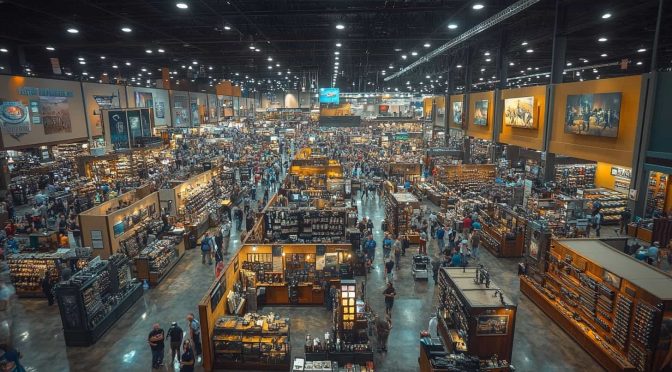Gun shows are an exciting experience for firearm enthusiasts, collectors, and newcomers alike. These events bring together vendors, private sellers, and industry experts, offering an unparalleled opportunity to explore a vast selection of firearms, ammunition, and accessories. However, for first-time attendees, the experience can be overwhelming without proper preparation. Understanding the layout, pricing strategies, and best practices for negotiation can make all the difference in ensuring a successful visit.
In this guide, we’ll cover everything you need to know before attending your first gun show, from preparation to making smart purchases and interacting with vendors.
Understanding the Gun Show Experience
Gun shows are unique because they offer buyers a chance to physically inspect firearms, compare prices, and engage directly with sellers. Unlike traditional retail stores, these events create an open marketplace where everything from antique rifles to modern handguns can be found under one roof.
Beyond firearms, attendees can explore a range of related products, including ammunition, gun safes, holsters, optics, and tactical gear. Some shows even feature historical collectibles, survival equipment, and hunting accessories.
One of the most exciting aspects of a gun show is the potential for direct interaction with knowledgeable vendors. Many of these sellers are industry experts or collectors who can provide valuable insights into the history, mechanics, and performance of different firearms.
Preparing for the Show: What to Bring and Expect
Proper preparation can enhance your gun show experience and help you make informed decisions. Here’s what you should consider before attending:
1. Research Gun Show Details
Check the official website or promotional materials for event details such as location, entry fees, parking, and vendor listings. Many shows offer multi-day passes, so decide how much time you want to spend exploring.
2. Know What You’re Looking For
Before arriving, make a list of firearms, accessories, or specific gear you’re interested in. Having a focused approach will prevent impulse purchases and ensure you get the best deals.
3. Bring Cash
Many vendors prefer cash transactions, as it saves them processing fees associated with credit cards. Carrying cash can also give you leverage when negotiating prices. However, be mindful of security and store your money discreetly.
4. Dress Comfortably and Prepare for Crowds
Gun shows can be busy, with long hours of walking and standing. Wear comfortable shoes and dress in layers to adjust to the indoor climate.
Navigating the Show Like a Pro
Arrive Early for the Best Selection
If you’re looking for rare or high-demand items, getting to the show early is key. The best deals and exclusive finds tend to go quickly, so plan to be among the first attendees.
Compare Prices Before Buying
Prices can vary between vendors for the same item. Walk through the show and take note of different pricing before making a purchase. This can help you negotiate more effectively.
Inspect Firearms Carefully
Whether you’re purchasing a new or used firearm, inspect it thoroughly. Look for wear, rust, or modifications that might affect its value and performance. If possible, ask to dry-fire the weapon (after confirming it’s unloaded) to test its action and trigger feel.
Ask Questions and Build Relationships
Gun show vendors often have years of experience in the industry. Don’t hesitate to ask about the history, specifications, or performance of a firearm. Building relationships with sellers can also lead to better deals and insider knowledge on upcoming inventory.
Legal Considerations and Background Checks
Understanding firearm laws is crucial before making a purchase at a gun show. Here are key points to keep in mind:
- Federal Firearms License (FFL) Dealers: Licensed dealers must conduct background checks on firearm buyers, just like in a gun store.
- Private Sales: Depending on your state laws, private sellers may not be required to perform background checks, but it’s always good to verify legal requirements.
- State and Local Regulations: Gun laws vary widely by state and locality. Make sure you’re familiar with purchase requirements, waiting periods, and firearm transport laws in your area.
Many gun shows provide information booths or legal representatives who can answer questions about state-specific regulations.
Negotiation Strategies for the Best Deals
Negotiating is an essential skill at gun shows. Vendors expect some level of bargaining, so don’t be afraid to engage in polite discussions about pricing.
1. Be Polite and Respectful
Aggressive haggling or lowball offers can turn vendors off. Instead, approach negotiations with courtesy and knowledge.
2. Use Market Research as Leverage
If you know the current market price of a firearm, mention it during negotiations. Sellers may be willing to match or beat the price to close a sale.
3. Bundle Purchases for Better Pricing
If you’re interested in multiple items from the same vendor, ask if they offer discounts for bulk purchases.
4. Be Willing to Walk Away
Sometimes, walking away from a deal is the best negotiation tactic. Vendors may reconsider their pricing when they see you’re not desperate to buy.
Final Thoughts: Enjoy the Experience
Gun shows are more than just shopping events; they are an opportunity to learn, connect with like-minded individuals, and immerse yourself in the firearm community. Even if you don’t make a purchase, attending a show can provide valuable insight into firearm trends, pricing, and new products.
As a first-time attendee, staying informed, prepared, and respectful will ensure you have a positive experience. Whether you walk away with a new firearm, ammunition, or just new knowledge, the time spent at a gun show is always worthwhile.

